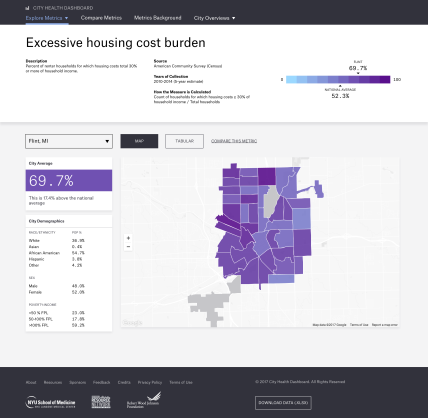City Health Dashboard Expanding to 500 More Cities

The City Health Dashboard—an innovative health data visualization tool created by the Department of Population Health at NYU Langone Medical Center and the Robert F. Wagner Graduate School of Public Service at NYU in partnership with the National Resource Network—will expand to 500 additional cities over the next two years through a new grant from the Robert Wood Johnson Foundation.
The expansion enables The Dashboard to become a critical health improvement planning resource for US cities with populations of 70,000 or more, or one-third of the US population, giving community leaders the ability to view data on their cities’ performance in 26 key measures of health such as obesity and primary care physician coverage. The Dashboard also illuminates key drivers of health status, such as housing affordability, high school graduation rates, food access, and deaths from opioids.
"There is an old adage: ‘What gets measured is what gets done,’ " said Marc Gourevitch (MD, MPH), Chair of the Department of Population Health, and Associate Professor of Public Service. “Community leaders want accurate, actionable, and precise data to advance initiatives that improve health, bring down costs, and focus on community well-being. We’re excited to be at the vanguard of providing this important information to cities across the country.”
The City Health Dashboard’s National Resource Network partner is part of the White House Council on Strong Cities, Strong Communities Initiative, and is a technical assistance program funded by the US Department of Housing and Urban Development (HUD). The Dashboard started in four pilot cities—Flint, Michigan; Kansas City, Kansas; Providence, Rhode Island; and Waco, Texas. Efforts to improve health are under way, as a result. For example, Prosper Waco, a nonprofit organization, is using the tool to help determine needs for services related to the teen birth rate.